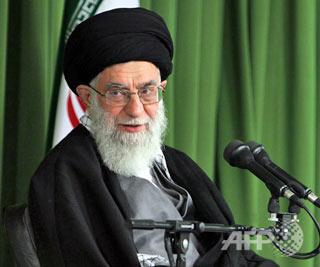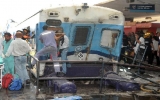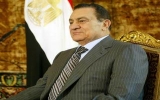Nuclear talks failure heightens Iran tensions
Update: 23-02-2012 | 00:00:00
A fruitless visit to Iran by UN nuclear inspectors raised tensions on Wednesday, with Russia warning of "catastrophic" consequences if it leads to a military attack on its Middle East ally.The United States expressed disappointment that no progress had been made, and France said Iran's refusal to let the inspectors in to a key military site was a "missed opportunity" that could undermine chances of reviving wider talks between Tehran and world powers.But as worries over Iran pushed world oil prices to nine-month highs, Iran's supreme leader, Ayatollah Ali Khamenei, was defiant.  Ayatollah Ali Khamenei (AFP PHOTO/KHAMENEI.IR) He made no mention at all of the International Atomic Energy Agency (IAEA) inspectors, instead reiterating the assertion that "the Iranian nation has never been seeking an atomic weapon and never will be."Possessing a nuclear bomb "constitutes a major sin," he told a group of nuclear scientists, but nuclear energy "is in Iran's national interest.""Pressure, sanctions, threats and assassinations will not bear any fruit and Iran will continue its path of (nuclear) scientific development."The IAEA said it had gone into the two-day visit to Tehran, and another inconclusive one last month, in a "constructive spirit," but that no agreement had been reached on efforts to elucidate Iran's nuclear activities.Despite requests, "we could not get access" to a military site in Parchin where suspected nuclear warhead design experiments were conducted, team leader and chief inspector Herman Nackaerts said on returning to Vienna.IAEA chief Yukiya Amano said the refusal to allow the Parchin inspection was "disappointing."The IAEA said that "at this point in time" there was no agreement with Iran on holding further talks.A Western diplomat in Vienna said Iran's posture on Parchin showed why the world community "lacks confidence in the nature of its nuclear programme.""This latest snub, along with its decision to begin enrichment at Qom, underscore Iran's defiance of the international community and multiple Security Council resolutions," said the diplomat.France said Iran's "refusal to cooperate" was "another missed opportunity" that added to a standoff already aggravated by the Islamic republic's recent boasts of nuclear progress."We cannot but consider all of this contrary to the intentions" declared by Iran to resume negotiations with the P5+1, said a spokesman.White House spokesman Jay Carney said "we regret the failure of Iran to reach an agreement with the IAEA. It's another demonstration of Iran's refusal to abide by its international obligations."The IAEA trip was seen as having an impact on the mooted resumption of talks between Iran and the P5+1 powers - Britain, China, France, Russia and the United States, plus Germany - which broke down 13 months ago.Oliver Thraenert, an analyst with the German Institute for International and Security Affairs, said the IAEA visit "shows clearly that Iran is not in the mood for substantial compromise," adding that the chances of negotiations now resuming were "not very high."Talk of possible military action against Iran by Israel, with or without US help, had given urgency to diplomatic attempts to lower tensions.Russia, which along with China has been giving Iran diplomatic cover, warned against that prospect."The scenario of military action against Iran would be catastrophic for the region and possibly the whole system of international relations," said Deputy Foreign Minister Gennady Gatilov.He urged nations to wait for the IAEA's official report before deciding to condemn Iran for failing to cooperate.The United States and Europe have been ramping up economic sanctions on Iran since November, when the IAEA published a report crystallising - though not entirely validating - Western suspicions it was pursuing nuclear weapons research in Parchin and elsewhere.The measures, targeting vital oil exports, added to four sets of non-economic UN sanctions punishing Iran for not giving timely explanations of its activities.Iran has repeatedly said the sanctions will not deter it from its nuclear ambitions, and it has threatened to strike back at any military action, possibly by closing the strategic Strait of Hormuz.This week, it deployed warplanes, missiles and radar facilities in exercises to boost the defences of its nuclear facilities.Iran "does not seek war and has never started a war, but it will vigorously defend its national interests," Defence Minister Ahmad Vahidi said.Iran has also announced a halt to the limited amount of oil it exported to Britain and France in retaliation for an EU embargo on its oil due to come fully into effect in July.On Tuesday, the government threatened to cut supplies to other EU nations if they did not stop their "hostile" policies.In the markets, Brent North Sea crude for delivery in April soared as high as $123.07 per barrel and New York's main contract, light sweet crude for April, jumped to $106.47 dollars - levels last seen in early May 2011."Once again, oil prices are firming on concerns about rising tensions between the West and Iran," GFT analyst David Morrison told AFP.Capital Economics analyst Julian Jessop warned the price could spike beyond $200 per barrel if the situation escalates.- AFP/de
Ayatollah Ali Khamenei (AFP PHOTO/KHAMENEI.IR) He made no mention at all of the International Atomic Energy Agency (IAEA) inspectors, instead reiterating the assertion that "the Iranian nation has never been seeking an atomic weapon and never will be."Possessing a nuclear bomb "constitutes a major sin," he told a group of nuclear scientists, but nuclear energy "is in Iran's national interest.""Pressure, sanctions, threats and assassinations will not bear any fruit and Iran will continue its path of (nuclear) scientific development."The IAEA said it had gone into the two-day visit to Tehran, and another inconclusive one last month, in a "constructive spirit," but that no agreement had been reached on efforts to elucidate Iran's nuclear activities.Despite requests, "we could not get access" to a military site in Parchin where suspected nuclear warhead design experiments were conducted, team leader and chief inspector Herman Nackaerts said on returning to Vienna.IAEA chief Yukiya Amano said the refusal to allow the Parchin inspection was "disappointing."The IAEA said that "at this point in time" there was no agreement with Iran on holding further talks.A Western diplomat in Vienna said Iran's posture on Parchin showed why the world community "lacks confidence in the nature of its nuclear programme.""This latest snub, along with its decision to begin enrichment at Qom, underscore Iran's defiance of the international community and multiple Security Council resolutions," said the diplomat.France said Iran's "refusal to cooperate" was "another missed opportunity" that added to a standoff already aggravated by the Islamic republic's recent boasts of nuclear progress."We cannot but consider all of this contrary to the intentions" declared by Iran to resume negotiations with the P5+1, said a spokesman.White House spokesman Jay Carney said "we regret the failure of Iran to reach an agreement with the IAEA. It's another demonstration of Iran's refusal to abide by its international obligations."The IAEA trip was seen as having an impact on the mooted resumption of talks between Iran and the P5+1 powers - Britain, China, France, Russia and the United States, plus Germany - which broke down 13 months ago.Oliver Thraenert, an analyst with the German Institute for International and Security Affairs, said the IAEA visit "shows clearly that Iran is not in the mood for substantial compromise," adding that the chances of negotiations now resuming were "not very high."Talk of possible military action against Iran by Israel, with or without US help, had given urgency to diplomatic attempts to lower tensions.Russia, which along with China has been giving Iran diplomatic cover, warned against that prospect."The scenario of military action against Iran would be catastrophic for the region and possibly the whole system of international relations," said Deputy Foreign Minister Gennady Gatilov.He urged nations to wait for the IAEA's official report before deciding to condemn Iran for failing to cooperate.The United States and Europe have been ramping up economic sanctions on Iran since November, when the IAEA published a report crystallising - though not entirely validating - Western suspicions it was pursuing nuclear weapons research in Parchin and elsewhere.The measures, targeting vital oil exports, added to four sets of non-economic UN sanctions punishing Iran for not giving timely explanations of its activities.Iran has repeatedly said the sanctions will not deter it from its nuclear ambitions, and it has threatened to strike back at any military action, possibly by closing the strategic Strait of Hormuz.This week, it deployed warplanes, missiles and radar facilities in exercises to boost the defences of its nuclear facilities.Iran "does not seek war and has never started a war, but it will vigorously defend its national interests," Defence Minister Ahmad Vahidi said.Iran has also announced a halt to the limited amount of oil it exported to Britain and France in retaliation for an EU embargo on its oil due to come fully into effect in July.On Tuesday, the government threatened to cut supplies to other EU nations if they did not stop their "hostile" policies.In the markets, Brent North Sea crude for delivery in April soared as high as $123.07 per barrel and New York's main contract, light sweet crude for April, jumped to $106.47 dollars - levels last seen in early May 2011."Once again, oil prices are firming on concerns about rising tensions between the West and Iran," GFT analyst David Morrison told AFP.Capital Economics analyst Julian Jessop warned the price could spike beyond $200 per barrel if the situation escalates.- AFP/de
 Ayatollah Ali Khamenei (AFP PHOTO/KHAMENEI.IR) He made no mention at all of the International Atomic Energy Agency (IAEA) inspectors, instead reiterating the assertion that "the Iranian nation has never been seeking an atomic weapon and never will be."Possessing a nuclear bomb "constitutes a major sin," he told a group of nuclear scientists, but nuclear energy "is in Iran's national interest.""Pressure, sanctions, threats and assassinations will not bear any fruit and Iran will continue its path of (nuclear) scientific development."The IAEA said it had gone into the two-day visit to Tehran, and another inconclusive one last month, in a "constructive spirit," but that no agreement had been reached on efforts to elucidate Iran's nuclear activities.Despite requests, "we could not get access" to a military site in Parchin where suspected nuclear warhead design experiments were conducted, team leader and chief inspector Herman Nackaerts said on returning to Vienna.IAEA chief Yukiya Amano said the refusal to allow the Parchin inspection was "disappointing."The IAEA said that "at this point in time" there was no agreement with Iran on holding further talks.A Western diplomat in Vienna said Iran's posture on Parchin showed why the world community "lacks confidence in the nature of its nuclear programme.""This latest snub, along with its decision to begin enrichment at Qom, underscore Iran's defiance of the international community and multiple Security Council resolutions," said the diplomat.France said Iran's "refusal to cooperate" was "another missed opportunity" that added to a standoff already aggravated by the Islamic republic's recent boasts of nuclear progress."We cannot but consider all of this contrary to the intentions" declared by Iran to resume negotiations with the P5+1, said a spokesman.White House spokesman Jay Carney said "we regret the failure of Iran to reach an agreement with the IAEA. It's another demonstration of Iran's refusal to abide by its international obligations."The IAEA trip was seen as having an impact on the mooted resumption of talks between Iran and the P5+1 powers - Britain, China, France, Russia and the United States, plus Germany - which broke down 13 months ago.Oliver Thraenert, an analyst with the German Institute for International and Security Affairs, said the IAEA visit "shows clearly that Iran is not in the mood for substantial compromise," adding that the chances of negotiations now resuming were "not very high."Talk of possible military action against Iran by Israel, with or without US help, had given urgency to diplomatic attempts to lower tensions.Russia, which along with China has been giving Iran diplomatic cover, warned against that prospect."The scenario of military action against Iran would be catastrophic for the region and possibly the whole system of international relations," said Deputy Foreign Minister Gennady Gatilov.He urged nations to wait for the IAEA's official report before deciding to condemn Iran for failing to cooperate.The United States and Europe have been ramping up economic sanctions on Iran since November, when the IAEA published a report crystallising - though not entirely validating - Western suspicions it was pursuing nuclear weapons research in Parchin and elsewhere.The measures, targeting vital oil exports, added to four sets of non-economic UN sanctions punishing Iran for not giving timely explanations of its activities.Iran has repeatedly said the sanctions will not deter it from its nuclear ambitions, and it has threatened to strike back at any military action, possibly by closing the strategic Strait of Hormuz.This week, it deployed warplanes, missiles and radar facilities in exercises to boost the defences of its nuclear facilities.Iran "does not seek war and has never started a war, but it will vigorously defend its national interests," Defence Minister Ahmad Vahidi said.Iran has also announced a halt to the limited amount of oil it exported to Britain and France in retaliation for an EU embargo on its oil due to come fully into effect in July.On Tuesday, the government threatened to cut supplies to other EU nations if they did not stop their "hostile" policies.In the markets, Brent North Sea crude for delivery in April soared as high as $123.07 per barrel and New York's main contract, light sweet crude for April, jumped to $106.47 dollars - levels last seen in early May 2011."Once again, oil prices are firming on concerns about rising tensions between the West and Iran," GFT analyst David Morrison told AFP.Capital Economics analyst Julian Jessop warned the price could spike beyond $200 per barrel if the situation escalates.- AFP/de
Ayatollah Ali Khamenei (AFP PHOTO/KHAMENEI.IR) He made no mention at all of the International Atomic Energy Agency (IAEA) inspectors, instead reiterating the assertion that "the Iranian nation has never been seeking an atomic weapon and never will be."Possessing a nuclear bomb "constitutes a major sin," he told a group of nuclear scientists, but nuclear energy "is in Iran's national interest.""Pressure, sanctions, threats and assassinations will not bear any fruit and Iran will continue its path of (nuclear) scientific development."The IAEA said it had gone into the two-day visit to Tehran, and another inconclusive one last month, in a "constructive spirit," but that no agreement had been reached on efforts to elucidate Iran's nuclear activities.Despite requests, "we could not get access" to a military site in Parchin where suspected nuclear warhead design experiments were conducted, team leader and chief inspector Herman Nackaerts said on returning to Vienna.IAEA chief Yukiya Amano said the refusal to allow the Parchin inspection was "disappointing."The IAEA said that "at this point in time" there was no agreement with Iran on holding further talks.A Western diplomat in Vienna said Iran's posture on Parchin showed why the world community "lacks confidence in the nature of its nuclear programme.""This latest snub, along with its decision to begin enrichment at Qom, underscore Iran's defiance of the international community and multiple Security Council resolutions," said the diplomat.France said Iran's "refusal to cooperate" was "another missed opportunity" that added to a standoff already aggravated by the Islamic republic's recent boasts of nuclear progress."We cannot but consider all of this contrary to the intentions" declared by Iran to resume negotiations with the P5+1, said a spokesman.White House spokesman Jay Carney said "we regret the failure of Iran to reach an agreement with the IAEA. It's another demonstration of Iran's refusal to abide by its international obligations."The IAEA trip was seen as having an impact on the mooted resumption of talks between Iran and the P5+1 powers - Britain, China, France, Russia and the United States, plus Germany - which broke down 13 months ago.Oliver Thraenert, an analyst with the German Institute for International and Security Affairs, said the IAEA visit "shows clearly that Iran is not in the mood for substantial compromise," adding that the chances of negotiations now resuming were "not very high."Talk of possible military action against Iran by Israel, with or without US help, had given urgency to diplomatic attempts to lower tensions.Russia, which along with China has been giving Iran diplomatic cover, warned against that prospect."The scenario of military action against Iran would be catastrophic for the region and possibly the whole system of international relations," said Deputy Foreign Minister Gennady Gatilov.He urged nations to wait for the IAEA's official report before deciding to condemn Iran for failing to cooperate.The United States and Europe have been ramping up economic sanctions on Iran since November, when the IAEA published a report crystallising - though not entirely validating - Western suspicions it was pursuing nuclear weapons research in Parchin and elsewhere.The measures, targeting vital oil exports, added to four sets of non-economic UN sanctions punishing Iran for not giving timely explanations of its activities.Iran has repeatedly said the sanctions will not deter it from its nuclear ambitions, and it has threatened to strike back at any military action, possibly by closing the strategic Strait of Hormuz.This week, it deployed warplanes, missiles and radar facilities in exercises to boost the defences of its nuclear facilities.Iran "does not seek war and has never started a war, but it will vigorously defend its national interests," Defence Minister Ahmad Vahidi said.Iran has also announced a halt to the limited amount of oil it exported to Britain and France in retaliation for an EU embargo on its oil due to come fully into effect in July.On Tuesday, the government threatened to cut supplies to other EU nations if they did not stop their "hostile" policies.In the markets, Brent North Sea crude for delivery in April soared as high as $123.07 per barrel and New York's main contract, light sweet crude for April, jumped to $106.47 dollars - levels last seen in early May 2011."Once again, oil prices are firming on concerns about rising tensions between the West and Iran," GFT analyst David Morrison told AFP.Capital Economics analyst Julian Jessop warned the price could spike beyond $200 per barrel if the situation escalates.- AFP/de
 Thai transport ministry launches 2.68 trillion THB infrastructure project
Thai transport ministry launches 2.68 trillion THB infrastructure project
 New Japanese Prime Minister with the mission to restore trust
New Japanese Prime Minister with the mission to restore trust
 ASEAN+3 to grow at 4.2% in 2024: research office
ASEAN+3 to grow at 4.2% in 2024: research office
 Thai PM outlines vision for regional cooperation at ACD forum
Thai PM outlines vision for regional cooperation at ACD forum
 Vietnam - a prime example of effective cooperation with UNESCO: Official
Vietnam - a prime example of effective cooperation with UNESCO: Official
 Strong earthquakes strike Philippines, Tonga
Strong earthquakes strike Philippines, Tonga
 Thailand school bus fire: Death toll rises to 25
Thailand school bus fire: Death toll rises to 25
 Philippines’ first EV battery factory inaugurated
Philippines’ first EV battery factory inaugurated
 World Peace Council lauds Vietnam’s human rights policy
World Peace Council lauds Vietnam’s human rights policy
 Indonesia: Landslide causes at least 15 deaths
Indonesia: Landslide causes at least 15 deaths



